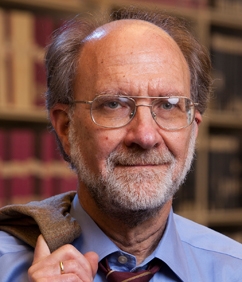Experts discuss surveillance, privacy, and freedom of expression
On September 26, leading human rights advocates appeared at NYU Law to discuss surveillance, privacy, and freedom of expression, and the global impact of the U.S. government’s current stance on these issues. Philip Alston, John Norton Pomeroy Professor of Law and co-chair of NYU Law's Center for Human Rights and Global Justice (CHRGJ), moderated the discussion, which featured Alexander Abdo, staff attorney for the ACLU’s National Security Project; Frank LaRue, U.N. Special Rapporteur on Freedom of Expression; and Katitza Rodriguez, international rights director of the Electronic Frontier Foundation.
With new revelations about the NSA surveillance programs emerging on an almost daily basis, each of the panelists expressed concern about the potential for infringement on the rights to privacy and freedom of expression. Abdo began the event with a discussion of the NSA’s collection of metadata—data collected about communications, such as who people contact, for how long, and when. “The NSA and the government’s primary defense of this dragnet collection of our metadata, information about our communications, is that… it’s not the content of our communications, and I think that’s a myopic view of privacy in the world,” said Abdo. “That information can be extraordinarily sensitive and, particularly when aggregated over a long period of time, it can often give a more detailed picture of your communications than even the content of your calls.”
A specialist in international privacy issues, including law enforcement, government surveillance, and cross-border data flows, Rodriguez focused on the international implications of the U.S. surveillance programs. “It has become very problematic at the international level, because countries like China will say, ‘Well, if the U.S. can spy on foreigners openly, we can do the same,’” Rodriguez said. “We like a global internet, that’s what we defend… so we’re in a difficult moment, and I think we need to start having a discussion in the United States about the privacy rights of foreigners within the NSA surveillance program.”
LaRue, who presented a report on surveillance, privacy, and freedom of expression to the U.N. Human Rights Council in June, argued that even though technology now allows for greater capacity to track communications, the rights to privacy and freedom of expression that applied prior to the advent of the internet should still be in effect. “The conditions we have for privacy should be the same ones we had before,” LaRue said. “All the rights we have offline, we should enjoy online. Nothing really changes; freedom of expression is the same if we’re speaking, if we send a letter, if we make a telephone call, or if we’re sending an email.”
The event was co-sponsored by the Open Society Justice Initiative, the CHRGJ, and Just Security, an online forum for the analysis of law, rights, and U.S. national security policy recently launched by Anne and Joel Ehrenkranz Professor of Law Ryan Goodman. The discussion of issues of surveillance, privacy, and expression continues online at Just Security—most recently, with Robert B. McKay Professor of Law Stephen Schulhofer’s post: “Making Sense of the NSA Metadata Collection Program and the ‘Administrative Search Doctrine.’”
Posted on October 3, 2013



